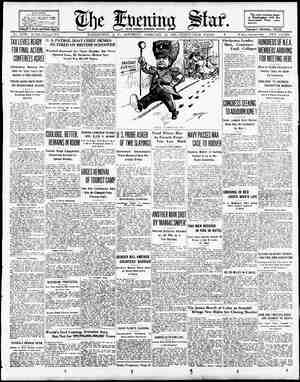The Daily Worker Newspaper, February 20, 1926, Page 7
You have reached the hourly page view limit. Unlock higher limit to our entire archive!
Subscribers enjoy higher page view limit, downloads, and exclusive features.
Sas a“ | ue 2 —* Buylmet + git BAILY WORKER. Second Section: This Magazine Section Appears Every Satirday in The DAILY WORKER, SATURDAY, FEBRUARY 20, 1926 Buried Alive John L. Lewis, betrayér of the United Mine Workers of America, has led the anthracite miners into a trap for the mine owners. Fred Ellis, the cartoonist, here shows the anthracite miner “buried alive” for five years by the contract which Lewis made with the bosses. But a militant struggle of the coal diggers against the.treacherous Lewis and his allies, the mine owners, will win control of the United Mine Workers’ Union for the mine workers—and the mine workers can escape from the trap. What Price Does Judas Get? The five-month anthracite strike has ended in a victory for the operators. They have secured all that they went after at the beginning of the negotiations, that is, no wage increase, no check- off, arbitration and a five-year contract. This victory for the operators and defeat for the miners was possible because John L. Lewis, president of the United Mine Workers, used his position in the union and his control of the en- tire union apparatus to prevent the miners throwing their full force into the struggle. Lewis has earned whatever reward the operators will give him including the post of secretary of labor in the Coolidge cabinet in connection with which he has been mentioned so frequently. _ The miners thruout the struggle never wavered. The 158,000 strikers showed the same willingness to fight as they have for twenty-five years. At the beginning of the strike the fact that the maintenance men were at work safeguarding the property of the operators did not worry the miners. They believed their offi- cials when they said that the strike was going to be “just a holi- day.” But as the months dragged on the strikers began demand- ing that the maintenance men be withdrawn. The same thing with the washeries that the officialdom allowed to work. And to- ward the end of the strike the general grievance committee of District 1 opposed the Lewis policy. . The miners showed that they were willing to fight had they been given a strong lead. But the entire apparatus of the union was in the hands of the agents of the operators and they used it to suppress all steps toward militant action on the part_of the rank and file. Instead of a 100 per cent militant strike Lewis conducted negotiations. From the beginning he was in favor of the oper- ators’ terms. The man who signed the Jacksonville agreement which hogtied the bituminous miners would not be against a sim- ilar agreement for the hard coal diggers. The months of negotia- tions were carried on by Lewis with one purpose: To secure an agreement which would give the operators what they wanted, framed in such a manner that he could claim it as a victory before the miners, The various plans, and the maneuvers of the Coolidge politicians, were all bent in this direction. The_steps thru which Lewis went in the negotiations show this. The Scranton Tri-District wage scale convention demanded a ten per cent wage raise, the checkoff, no arbitration and a short term agreement. Lewis first shunted the wage raise into the background and played up the check-off. Then the checkoff was forgotten and he bluffed that he was absolutely opposed to arbi- tration when he said that he would never agree to the arbitration of the very lives of the miners. Finally the agreement was signed and the operators have gotten what they went after: No wage increase, no checkoff, arbitration and a long-term agreement. As soon as the agreement was signed the capitalist press re-) ported that stocks shot up in Wall Street. Editorial writers di- lated on the long period of peace ahead in the anthracite. The entire ruling class of the country heaved a great sigh’ of relief. The 158,090 workers had been defeated—profits were safe and greater profits were to come, ’ The miners return to thé mines to work under this agree- ment. The operators will take full advantage of it to reduce | (Continued on newt paye—piage 2)




